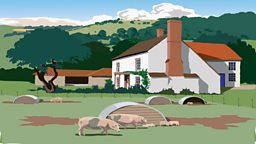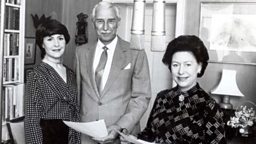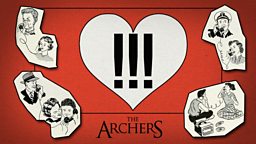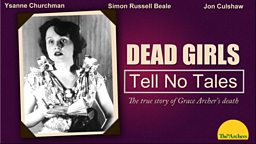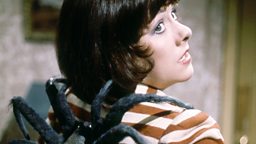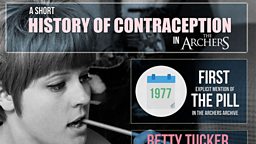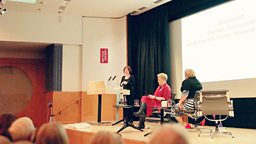Ambridge at War: the first of a trilogy of prequels to The Archers

The people and events of Ambridge are well documented in The Archers since it first aired on the ���˿��� ���˿��� Service on 1 January 1951. But, aside from the pilot episodes which were broadcast only to the Midlands in 1950, we don’t know much about life in Borsetshire’s best village before this time.
As The Archers approaches its 70th anniversary the first of a trilogy of prequels to The Archers is published. Set in 1940, Ambridge at War follows the fortunes of the village during the early months of the Second World War.
Its author, Catherine Miller, shares what it’s like entering the universe of The Archers and creating a wartime Ambridge.
What did you know about The Archers before this project?
I am a fan but I’m a convert so I’m over-zealous. My parents didn't listen to it so I didn't grow up with it on in the background. I found it in my 20s and I was amazed that this was there, hidden from me!
I remember the one [storyline] that cemented it for me, having been a fan for a while, was the whole, wonderful ride with Brian Aldridge and Siobhan which took so long and was so real. He was such a weak, vain, idiotic thing and she really felt she was in love. Then you knew he had Jennifer at home. I remember thinking, “This is like an epic movie”. I think that's one of the things I like about The Archers is the pacing. They give things time.
Which characters are your favourites?
One of the things that The Archers rewards you with, if you’ve listened for a long time, is that eventually everyone has to marry everyone else! I've always loved Jolene, I've always gone “gggrrrr” whenever Kenton hoves into view. The fact that they are now married, and it is such a terrible mismatch that somehow works, and she is annoyed and an irritated by him as I am, is perfect for me.
I was really sad when Nigel died but I think what they've done with Elizabeth since then is really moving and very interesting. I love that it's taken her ages to confront her own unhappiness and loneliness.
Tell us about Ambridge at War…
We felt there was a real need for an Ambridge standalone novel that stood up as a novel and did great service to the story of Ambridge. But if you dip into the universe [of The Archers] at all, you affect it. So, we thought let's go back before the radio series and once you step back 70 years the obvious landmark is the [Second World] War.
The war gave us opportunity to have people in Ambridge who would not normally be there so it felt like the possibilities for drama were huge. [The Archers] was very definitely post-war when it started. It was a way to drum up feeling for the farmers, it was quite a piece of propaganda, and it was also a way of celebrating ordinary people and how hard they worked and how they got through life. So, I think the War and Ambridge is a very, very good fit.
[In Ambridge at War] there are people falling in love with the wrong people and there are people losing people. We wanted them to have very human reactions. So there's patriotism on the outside and terrible fear and resentment as well on the inside. At the beginning of the book everybody's wondering “Blimey, is this all real?” and by the end of the book there's not one person left untouched.
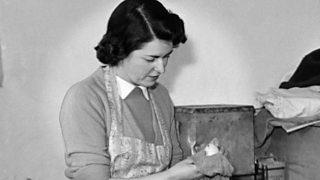
What surprised you when you started working on this project and crossed over from being a listener to going behind the scenes?
Once you look behind the curtain, there is this vast machine and it's making a lot of noise, but nobody ever hears it! There’s very much a team that work there and they are all absolutely dedicated to keeping everything straight. I couldn't just make things up which is how writers normally work. Everything had to be double checked within this incredibly tight framework. There are family trees for every character. There are maps of Ambridge, there are maps of Borsetshire, worryingly! Every script is kept, every character has a “bible”. And even if it wasn't written down, I would then get another email from somebody saying “I remember having a conversation in 1998…”
Everything from which cows were kept on Brookfield Farm to which cottage had an inside toilet and which didn't. By the time I got to the last bits of editing, I was going to bed and dreaming about Walter Gabriel and nobody wants to do that! I knew so much and now it’s kind of gone. It's a bit like cramming for your GCSEs. Now I'm gathering all my stuff back again and getting out all the family trees and the maps out again [to write book two].
One drawback of writing the books is when I hear the theme tune I get anxious. I think I should be at my desk, writing!
It must have been exciting to populate Ambridge in 1940 with your own characters…
It was so exciting, it didn't feel like work at all. But there was a great deal of responsibility because [Ambridge at War] is part of The Archers universe whatever goes into that universe stays. So, for example, the grandfather I’ve given Nigel Pargetter is Nigel Pargetter’s grandfather. I've had to be very careful to make sure that nothing about him and his life impacts on the history since then.
Then there are other people, who have no descendants, who I helicoptered in and dropped into cottages that I’ve made up and they are people I've always wanted to write. That was very exciting too.
To populate a 1940s village is really exciting because there's so much more imagination needed. Storylines without mobile phones or computers are wonderful because there are far fewer ways for people to discover things or to know things. So, you can have a lot more secrets and lies...
Doris Archer and Alec Pargetter feature prominently in Ambridge at War, why did you choose these two to be the main characters?
One of the fun bits of writing it, and I hope reading it, is the recognition factor of either characters like Walter and amazingly, Peggy. Peggy is still in [The Archers] and she's in the book. You have Peggy and Jack Archer meeting in the book. Of course we know they go on to get married, but they don’t know that. That felt like a brilliant opportunity to radiate warmth out through the reader, if they're an avid listener.
I knew I wanted to deal with Doris because she's a woman. She's not the farmer but the farmer's wife. And yet, take any farmer's wife out of the farmhouse and the whole thing would collapse. So I really wanted to do her justice and I wanted to explore how Doris would cope [with the changes the war brought] and still be patriotic. Then I thought, I need a man and I really wanted somebody that we could find quite glamourous.
Also, Doris is very solidly working class and Alec is born into luxury. They don't have anything at all in common except the village, and there's a great deal of politeness on both sides, but there's also a great deal of misunderstanding. I loved inhabiting both their lives, although if I met them in life I’d have a clear favourite. I'd love to see Doris’ kitchen, I wouldn't much want to sit around Alec!
Now you’ve been behind the scenes of The Archers and written a book set in Ambridge do you see The Archers differently from when you were only a listener?
Yes, I do see it differently. I see it more in the context of British social history, both in the actual drama we hear and in the genesis of it. As a piece of social history, I see it as really important and as something that the ���˿��� brings that other broadcasters have never been required to bring or even considered bringing which is kind of conscience and a sense of history.
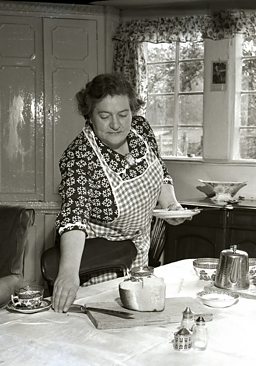
I really appreciate the storylines now as well, because I know how much wrangling there is to get anything new done in The Archers. It has to sit properly [with what already exists]. I respect the creatives a lot more and I appreciate its standing in culture more.
What do you think is the secret is to The Archers longevity?
I don't think there's any mystery. It's a really good drama and it never lets up and it manages to be surprising and funny as well. They reflect life but they don't paint it in so lurid a colour that you don't relate to it. I can see exactly why people love it.
Even if there's a few storylines running concurrently and they happen to be all the characters that you’re least fond of, you just stick with it because it's so comfortable and it's comforting as well.
What can we expect from the rest of the trilogy?
In book two, somebody we've grown to love will get killed off very early on. There’s a will that sets the whole village gossiping and eavesdropping on each other. We've also got an influx of foreigners. I've got a dashing Polish officer coming in, being very gallant around the ladies and I've got a spooky evacuee whose arrival unsettles everyone.
The trilogy will be loosely based on the War itself so [Ambridge at War] is the first proper year and then we’re going to leap forward six months for book two and book three will probably see us getting to the end of the War. Although, book two isn’t finished yet and while I have a grand plan for it all so much happens in the writing. But that's the plan, that it is really a chronicle of Ambridge during the War.
Ambridge at War by Catherine Miller is available now.

